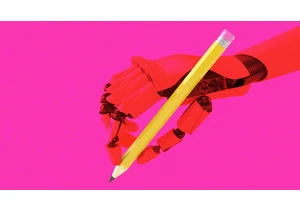Thanks for spending time with Plugged In, Fast Company’s weekly tech newsletter. If a friend or colleague forwarded this edition to you—or you’re reading it on FastCompany.com—you can check out previous issues and sign up to get it yourself every Wednesday morning. If you have any feedback or ideas for future newsletters, drop me a line at hmccracken@fastcompany.com.
A very happy Thanksgiving Day to you. In case you haven’t seen them yet, a few Fast Company tech stories you may want to check out:
- Is an AGI breakthrough the cause of the OpenAI drama?
- Misinformation research is under attack. So what’s the plan for 2024?
- Nobody’s talking about this hidden threat in generative AI
First, a disclaimer: Writing a newsletter about what’s happening at OpenAI is a fraught endeavor. So much has happened so quickly that between the moment I press the “Publish” button and the time you read this, further shockers could have obliterated any attempt at timely analysis.
Still, there are some things about the episode that even further bizarre turns of events can’t undo. One of them is its fundamental bizarreness. Even the few prior moments in business history that people have been bringing up as precedents—such as Steve Jobs’ removal from Apple in 1985—are nothing like this. Or at least I don’t remember almost every Apple employee signing a letter threatening to quit unless Jobs was reinstated.
To recap some of the major elements of the current drama so far:
- On Friday, for reasons that remain murky, OpenAI’s board fires CEO Sam Altman and removes chairman Greg Brockman, appointing CTO Mira Murati as interim CEO; Brockman, who is also president, resigns in protest
- Over much of the weekend, the chances seem decent that Altman will be reinstated
- Instead, the board appoints former Twitch CEO Emmett Shear as OpenAI’s second interim CEO in a little over 48 hours
- As Monday approaches, Microsoft CEO Satya Nadella offers jobs to every OpenAI employee who wants one at a new AI group run by Altman and Brockman
- Nearly all staffers sign the letter saying they’ll accept Microsoft’s offer unless Altman and Brockman return and the OpenAI board steps down, including—and to me, this is the weirdest plot point so far—chief scientist Ilya Sutskever, one of the board members who’d engineered Altman’s termination
- As of the moment I’m typing this, Altman and Brockman rejoining OpenAI is still apparently a live possibility
As extraordinary as all this is, I can’t help but believe it’s a harbinger of things to come in the AI era. After all, if OpenAI had been started to make (let’s say) file-compression software, its founders wouldn’t have made it a nonprofit and given it a board whose mandate was to develop its products responsibly rather than maximize their economic potential. If it were that same file-compression startup, internal disagreements over its future wouldn’t be regarded by anyone as involving the fate of humanity. Neither would Microsoft have invested $13 billion in such a company or seen its breakthroughs as critical to the future of everything from Windows to Azure, turning OpenAI’s crisis into a Microsoft crisis. And a file-compression company’s 700 staffers wouldn’t be courted by tech giants en masse, giving them the freedom to sign a threatening letter to their current employer’s board, repercussions be damned.
At every twist and turn of this saga, the fact that the technology in question was AI prompted the people involved to behave as they did. And however things settle down for OpenAI, the fundamental dynamics won’t change. Many smart people will remain apprehensive about AI’s potential impact on the world. Many others will see it as the most profound business opportunity since the Industrial Revolution. The fact that some people will fall into both camps only complicates matters further.
Will the AI industry learn anything from what OpenAI has been going through? Maybe, though its takeaway won’t necessarily be particularly healthy. If Microsoft and other investors’ profit motive ends up trumping OpenAI’s founding desire to err on the side of keeping its AI safe, it could open the floodgates for other companies whose commitment to responsible AI is less serious than those of both OpenAi and Microsoft. (Tidbit from my recent Fast Company cover story on Nadella’s AI initiative: At the time I reported the story, Microsoft had 129 employees dedicated to AI safety, and a total of 350 whose work involved it at least in some respects.)
Even if you see the board members who voted to oust Altman as clowns who couldn’t even play one-dimensional chess, they may have done us a favor by revealing how fragile OpenAI really was. There must be better ways to manage the technology thoughtfully—and there may not be that many that would be worse.
Oh, and one other thing: If there’s one overarching lesson here, it’s that human beings are weird, unpredictable, and prone to making decisions without considering their implications. I’m all for protecting humanity from erratic AI—but let’s not forget to protect AI from erratic humans along the way.
Melden Sie sich an, um einen Kommentar hinzuzufügen
Andere Beiträge in dieser Gruppe


A “click-to-cancel” rule, which would have required busines

Yesterday, Apple unexpectedly announced the most radical shakeup to its C-suite in years. The company revealed that Jeff Williams, its current chief operating officer (COO), will be departing the

As Congress moves to make massive cuts to public broadcasting this week, Paula Kerger, president and CEO of the Public Broadcasting Service (PBS), gives an unflinching look at the organization’s f


Just over a month ago, Samsung did something strange to start hyping up its next foldable phone announcements.
Those phones, which Samsung revealed today, are officially called the Samsu

